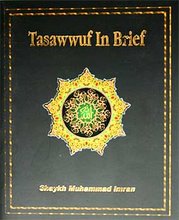
Tuesday, 25 March 2008
Saturday, 22 March 2008
Thursday, 20 March 2008
Wednesday Hadith Lesson.....Recommendations with regard to Women
بسم الله الرحمن الرحيم الحمد لله رب العالمين والصلوة والسلام على سيدنا محمد رسوله الرؤوف الرحيم
قال الله تعالى: ولهن مثل الذي عليهن... (البقرة : ٢٢٨)
“…Women have similar rights to what they are owed…” (Al-Baqarah: 228)
عن معاوية بن حيدة رضي الله عنه قال: قلت: يا رسول الله ما حق زوجة احدنا عليه؟ قال: أن تطعمها إذا طعمت وتكسوها إذا اكتسيت ولاتضرب الوجه ولاتقبح ولاتهجر إلا في البيت. (أبو داوود)
Mu’awiyah ibn Haydah radhiyallahu anhu is reported to have said: "I asked, ‘O Messenger of Allah, what is the right of someone's wife over him?' He said, 'That you feed her when you eat and clothe her when you clothe yourself and do not strike in the face. Do not malign her and do not keep apart from her, except in the house.'" [Abu Dawud]
It is a common misconception that the husband in a marriage is owed more rights than he himself owes. This idea is clearly rejected by the Quran in the above mentioned verse, which the great commentator explains thus:
لهن من حقوق الزوجية على الرجال مثل ما للرجال عليهن
“In a marriage, the women have as many rights over the men as the men do over them.”
Ibn Zayd explained it thus:
تتقون الله فيهن كما عليهن أن يتقين الله فيكم
“You [husbands] must fear Allah with regard to their [wives’] rights, just as it is necessary for them to fear Allah with regard to yours.”
It has become widespread that a husband is careless and negligent of his own appearance and state whilst expecting that his wife remains adorned and beautified at all times. This is a selfish attitude which leads to quarrelling and disputes. A common example is that of a smoker who after smoking comes to his wife with the most awful stench coming from his mouth, body and clothes. Naturally, his wife is reluctant to go to him, so he complains that she doesn’t love him and is not attracted to him! And many conflicts happens..
The great sahabi and commentator of the Quran, Sayyiduna Abd ‘Allah ibn Abbas radhiyallahu anhu stated:
إني لأتزين لامرأتي كما تتزين لي؛ وما أحب أن أستنظف كل حقي الذي لي عليها فتستوجب حقها الذي لها علي
“I am keen to adorn myself for my wife just as she adorns herself for me. And I do not wish to simply take all my rights that she owes to me for she deserves her rights that I owe to her.”
Furthermore, as the hadith we mentioned at the beginning states, it is the right of the wife that her husband feeds her, clothes her and is never aggressive and violent towards her.
The hadith also states that a man should not separate from his wife except in the house.
This is in reference to one of the stages of disciplining an extremely disobedient wife where the husband is advised to separate the sleeping arrangements when the wife simply does not leave her wrong ways. So even in this situation, he is ordered to remain at home and not, as some do, leave the wife for many months whilst he is away on holiday! Nor can he stop talking to her; the separation is only in sleeping arrangements.
Even when one’s spouse is troublesome, Islam has placed sanctions on the action one may take, how then would it allow aggression and violence?
Ulama have written that it is a fiqhi mas’alah that husband cannot stay away from his wife more than 4 months without her permission even if it is a sacred journey i.e. hajj, to seek Islamic knowledge or in tabligh
واخر دعوانا ان الحمد لله رب العالمين
Next week (Insha ‘Allah): The Most Complete Believer…
قال الله تعالى: ولهن مثل الذي عليهن... (البقرة : ٢٢٨)
“…Women have similar rights to what they are owed…” (Al-Baqarah: 228)
عن معاوية بن حيدة رضي الله عنه قال: قلت: يا رسول الله ما حق زوجة احدنا عليه؟ قال: أن تطعمها إذا طعمت وتكسوها إذا اكتسيت ولاتضرب الوجه ولاتقبح ولاتهجر إلا في البيت. (أبو داوود)
Mu’awiyah ibn Haydah radhiyallahu anhu is reported to have said: "I asked, ‘O Messenger of Allah, what is the right of someone's wife over him?' He said, 'That you feed her when you eat and clothe her when you clothe yourself and do not strike in the face. Do not malign her and do not keep apart from her, except in the house.'" [Abu Dawud]
It is a common misconception that the husband in a marriage is owed more rights than he himself owes. This idea is clearly rejected by the Quran in the above mentioned verse, which the great commentator explains thus:
لهن من حقوق الزوجية على الرجال مثل ما للرجال عليهن
“In a marriage, the women have as many rights over the men as the men do over them.”
Ibn Zayd explained it thus:
تتقون الله فيهن كما عليهن أن يتقين الله فيكم
“You [husbands] must fear Allah with regard to their [wives’] rights, just as it is necessary for them to fear Allah with regard to yours.”
It has become widespread that a husband is careless and negligent of his own appearance and state whilst expecting that his wife remains adorned and beautified at all times. This is a selfish attitude which leads to quarrelling and disputes. A common example is that of a smoker who after smoking comes to his wife with the most awful stench coming from his mouth, body and clothes. Naturally, his wife is reluctant to go to him, so he complains that she doesn’t love him and is not attracted to him! And many conflicts happens..
The great sahabi and commentator of the Quran, Sayyiduna Abd ‘Allah ibn Abbas radhiyallahu anhu stated:
إني لأتزين لامرأتي كما تتزين لي؛ وما أحب أن أستنظف كل حقي الذي لي عليها فتستوجب حقها الذي لها علي
“I am keen to adorn myself for my wife just as she adorns herself for me. And I do not wish to simply take all my rights that she owes to me for she deserves her rights that I owe to her.”
Furthermore, as the hadith we mentioned at the beginning states, it is the right of the wife that her husband feeds her, clothes her and is never aggressive and violent towards her.
The hadith also states that a man should not separate from his wife except in the house.
This is in reference to one of the stages of disciplining an extremely disobedient wife where the husband is advised to separate the sleeping arrangements when the wife simply does not leave her wrong ways. So even in this situation, he is ordered to remain at home and not, as some do, leave the wife for many months whilst he is away on holiday! Nor can he stop talking to her; the separation is only in sleeping arrangements.
Even when one’s spouse is troublesome, Islam has placed sanctions on the action one may take, how then would it allow aggression and violence?
Ulama have written that it is a fiqhi mas’alah that husband cannot stay away from his wife more than 4 months without her permission even if it is a sacred journey i.e. hajj, to seek Islamic knowledge or in tabligh
واخر دعوانا ان الحمد لله رب العالمين
Next week (Insha ‘Allah): The Most Complete Believer…
Thursday, 13 March 2008
Wednesday Hadith Lesson.....Recommendations with regard to Women
In the name of Allah, the Beneficent, the Merciful.
In continuation from last week’s hadith, wherein the Messenger of Allah, Sallallahu Alaihi Wasallam, advises a man not to hate his wife; for if he dislikes one of her traits there will definitely be another which will appeal to him.
To treat her well and in an appropriate manner it is important to understand her status that Allah has bestowed her with. When we look into the stages in a life of a woman we find that when she is born Allah places her in the trust of her father and it has been made incumbent upon him to feed her, clothe her and provide her every need. This act of bringing up a daughter holds great virtue in the eyes of Allah. The Messenger of Allah, Sallallahu Alaihi Wasallam, said in a hadith:
“The one who takes care of two girls (in another narration: one girl), he and I will be like this on the Day of Judgement.”(Indicating to his two fingers closed together). (Muslim)
Thereafter, the next stage in her life is that she becomes someone’s wife. At this point, the husband becomes responsible for taking care of her and providing for her. Allah has given the wife the role of a queen, where she needs not go out to work and earn but her husband must do so and provide her according to his capability. And as we have discussed in previous weeks, the Messenger of Allah, Sallallahu Alaihi Wasallam, has given great emphasis upon the good treatment of wives.
After becoming a wife, next a woman becomes a mother. What to say about the importance of a child treating his/her mother with the utmost reverence, love, affection and care. It is very well-known that our beloved Master informed us that Jannah lies beneath a mother’s feet. Serving her and pleasing her is the key to the higher levels in Jannah.
So we can see that Islam gives great honour to women and it is an extremely far-fetched notion that Islam would ever give permission, let alone encourage, domestic violence.
Domestic violence and wife-beating is Haraam- Totally Forbidden.
Islam also acknowledges that tense and difficult times sometimes do occur. Even in these situations we are taught how to go about solving our problems. Such as reminding one’s spouse of Allah’s and His Messenger’s teachings and advices for a married couple. Thereafter, if a solution is not reached they should separate their sleeping quarters and wait to see if this brings about the correct awareness. Even after this, one may not hit or beat his wife. The most he should do is tap her sternly, to express displeasure. This should not leave a mark or even pain, that what is meant in Qur’an by saying hit them…
Insha Allah, we will continue next week.
In continuation from last week’s hadith, wherein the Messenger of Allah, Sallallahu Alaihi Wasallam, advises a man not to hate his wife; for if he dislikes one of her traits there will definitely be another which will appeal to him.
To treat her well and in an appropriate manner it is important to understand her status that Allah has bestowed her with. When we look into the stages in a life of a woman we find that when she is born Allah places her in the trust of her father and it has been made incumbent upon him to feed her, clothe her and provide her every need. This act of bringing up a daughter holds great virtue in the eyes of Allah. The Messenger of Allah, Sallallahu Alaihi Wasallam, said in a hadith:
“The one who takes care of two girls (in another narration: one girl), he and I will be like this on the Day of Judgement.”(Indicating to his two fingers closed together). (Muslim)
Thereafter, the next stage in her life is that she becomes someone’s wife. At this point, the husband becomes responsible for taking care of her and providing for her. Allah has given the wife the role of a queen, where she needs not go out to work and earn but her husband must do so and provide her according to his capability. And as we have discussed in previous weeks, the Messenger of Allah, Sallallahu Alaihi Wasallam, has given great emphasis upon the good treatment of wives.
After becoming a wife, next a woman becomes a mother. What to say about the importance of a child treating his/her mother with the utmost reverence, love, affection and care. It is very well-known that our beloved Master informed us that Jannah lies beneath a mother’s feet. Serving her and pleasing her is the key to the higher levels in Jannah.
So we can see that Islam gives great honour to women and it is an extremely far-fetched notion that Islam would ever give permission, let alone encourage, domestic violence.
Domestic violence and wife-beating is Haraam- Totally Forbidden.
Islam also acknowledges that tense and difficult times sometimes do occur. Even in these situations we are taught how to go about solving our problems. Such as reminding one’s spouse of Allah’s and His Messenger’s teachings and advices for a married couple. Thereafter, if a solution is not reached they should separate their sleeping quarters and wait to see if this brings about the correct awareness. Even after this, one may not hit or beat his wife. The most he should do is tap her sternly, to express displeasure. This should not leave a mark or even pain, that what is meant in Qur’an by saying hit them…
Insha Allah, we will continue next week.
Wednesday, 12 March 2008
Thursday, 6 March 2008
Wednesday Hadith Lesson.....Recommendations with regard to Women
بسم الله الرحمن الرحيم الحمد لله رب العالمين والصلوة والسلام على سيدنا محمد رسوله الرؤوف الرحيم
Abdullah bin Zam`ah (May Allah be pleased with him) reported that he heard the Prophet (PBUH) giving a speech when he mentioned the she-camel (of Prophet Salih) and the man who had killed her. Messenger of Allah (PBUH) said: "when the most wicked man among them went forth (to kill the she-camel).' (91:12) signifies that a distinguished, wicked and most powerful chief of the people jumped up to kill the she-camel.'' Then he (PBUH) made mention of women and said, "Some of you beat your wives as if they were slaves, and then lie with them at the end of the day." Then he (PBUH) admonished them against laughing at another's passing of wind, saying, "Why does any of you laugh at another doing what he does himself."[Al-Bukhari and Muslim].
Abdullah bin Zam`ah (May Allah be pleased with him) reported that he heard the Prophet (PBUH) giving a speech when he mentioned the she-camel (of Prophet Salih) and the man who had killed her. Messenger of Allah (PBUH) said: "when the most wicked man among them went forth (to kill the she-camel).' (91:12) signifies that a distinguished, wicked and most powerful chief of the people jumped up to kill the she-camel.'' Then he (PBUH) made mention of women and said, "Some of you beat your wives as if they were slaves, and then lie with them at the end of the day." Then he (PBUH) admonished them against laughing at another's passing of wind, saying, "Why does any of you laugh at another doing what he does himself."[Al-Bukhari and Muslim].
Continuing from last week’s lesson, we come to the next hadith which Imaam al-Nawawi has brought under the chapter headed: "recommendations with regard to women." In this hadith, the narrator has made mention of three things that The Messenger of Allah, sallallahu alaihi wasallam, admonished the people regarding. Our focus is on the second phrase: "Some of you beat your wives as if they were slaves, and then lie with them at the end of the day."
The Messenger of Allah, throughout his blessed life, ordered kindness and compassion with all, whether it is humans or even animals. Hence, the companions once asked: "Shall we be rewarded for showing kindness to the animals also?'' He, sallallahu alaihi wasallam, said, "A reward is given in connection with every living creature."[Al-Bukhari and Muslim].
This is one of many such examples which show the emphasis he placed upon goodness and kindness to all creatures. Let alone one’s wife!
Abu Hurairah (May Allah be pleased with him) reported: Messenger of Allah, sallallahu alaihi wasallam, said, "A believer must not hate a believing woman (his wife); if he dislikes one of her characteristics he will be pleased with another".[Muslim].
This is the next hadith in this chapter. In this narration we find a beautiful principle for a happy married life. Here, the Messenger of Allah, sallallahu alaihi wasallam, acknowledges the fact that everyone has shortcomings and if one was to take his wife to task for her every fault; the joy of their married life would almost definitely be short-lived.
It is up to each individual to ensure that he overlooks the minor faults of the other, which will naturally become apparent. One must endure, show patience and forgive the shortcomings and thereafter, as our beloved Master advised, he should look at and concentrate upon the good qualities and favors of the spouse.
Islam acknowledges that a man can not remain in a constant state of happiness. But Islam also teaches ways of handling such situations, for example, walking away from a heated situation and praying to Allah for help, and thereafter returning to one’s spouse with a loving smile.
In such a situation where one comes to know of a fault of the spouse, one should immediately take his attention to her better qualities and he will realize that she possesses many. As the Messenger of Allah, sallallahu alaihi wasallam, said, "People are mines." This is in reference to the different materials that can be extracted from mines, and they are only discovered through searching into them. Hence, if one wants to, he will find many good and pleasing qualities in his spouse. On the other hand, if one expects his spouse to be perfect and always saying and doing only those things which comply with his desires, he is heading for a life of misery and discomfort.
"Even a stopped clock is right twice a day."
Shaykh Ashraf Ali Thanwi mentioned that there was once a pious scholar whose wife passed away. His children tried to persuade him not to wed again, claiming that they would suffice and serve him. However, he knew better, and hence, he married again. Some time later, he fell ill, and no one of his children was there to serve him as his new wife did. She stayed by his side and ran to his every need. One day, when he was back to good health, he was teaching his students when suddenly he received the news that his wife was ill. Immediately, he stood up and rushed to her side, sending his students away. People began taunting him but he would not care and he would say, "What my wife has done for me, no one could ever do."
This is a good example of how our pious predecessors gave importance to their marriages and keeping them in a way that conforms to the teachings of our beloved Messenger.
The husband should have a sense of humour to cheer his wife, sooth her pains and show his noble character because this will strengthen the bonds of love and respect between them.
واخر دعوانا ان الحمد لله رب العالمين وبالله التوفيق والعون فإنه هو الموفق والمعين
Subscribe to:
Comments (Atom)





